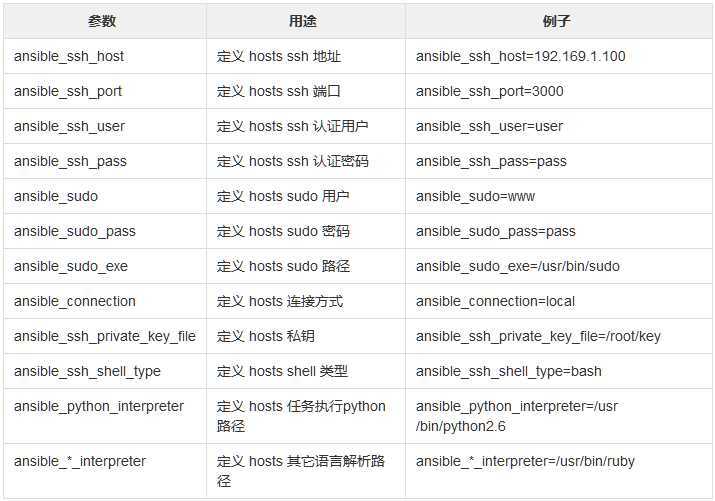Inventory:清单,主机清单
官方链接:https://docs.ansible.com/ansible/latest/user_guide/intro_inventory.html#
[root@ansible-server ~]# vim /etc/ansible/hosts
[test]
172.22.69.216
[web]
172.22.69.97
这样定义完,进行测试会失败
[root@ansible-server ~]# ansible web -m ping -o
[root@ansible-server ~]# vim /etc/ansible/hosts
[test]
172.22.69.216 ansible_ssh_user=‘root‘ ansible_ssh_pass=‘123456‘
[web]
172.22.69.97 ansible_ssh_user=‘root‘ ansible_ssh_pass=‘123456‘
这样定义完,就可以免用户名和密码进行测试
此处假如把172.22.69.216的sshd端口改为2222
[root@ansible-node ~]# vim /etc/ssh/sshd_config
Port 2222
ansible服务器连接客户机默认端口是22
所以需要在 /etc/ansible/hosts 修改端口信息
[root@ansible-server ~]# vim /etc/ansible/hosts
[test]
172.22.69.216 ansible_ssh_user=‘root‘ ansible_ssh_pass=‘123456‘ ansible_ssh_port=‘2222‘
[web]
172.22.69.97 ansible_ssh_user=‘root‘ ansible_ssh_pass=‘123456‘
ansible内部变量可以帮助我们简化主机清单的设置
[root@ansible-server ~]# vim /etc/ansible/hosts
[test]
172.22.69.216
[web]
172.22.69.97
[test:vars]
ansible_ssh_user=‘root‘
ansible_ssh_pass=‘123456‘
ansible_ssh_port=‘2222‘
[web]
ansible_ssh_user=‘root‘
ansible_ssh_pass=‘123456‘
常用变量

将不同的分组进行组合
[root@ansible-server ~]# vim /etc/ansible/hosts
[test]
172.22.69.216 ansible_ssh_user=‘root‘ ansible_ssh_pass=‘123456‘ ansible_ssh_port=‘2222‘
[web]
172.22.69.97 ansible_ssh_user=‘root‘ ansible_ssh_pass=‘123456‘
[linux:children]
test
web
创建主机列表文件
[root@ansible-server ~]# vim /tmp/hostlist
[centos]
172.22.69.217
172.22.69.218
[centos:vars]
ansible_ssh_user=‘root‘
ansible_ssh_pass=‘666666‘
测试
[root@ansible-server ~]# ansible -i /tmp/hostlist centos -m ping
-i 选项指定主机列表文件,以及文件中的主机组
原文:https://www.cnblogs.com/ElegantSmile/p/12588799.html